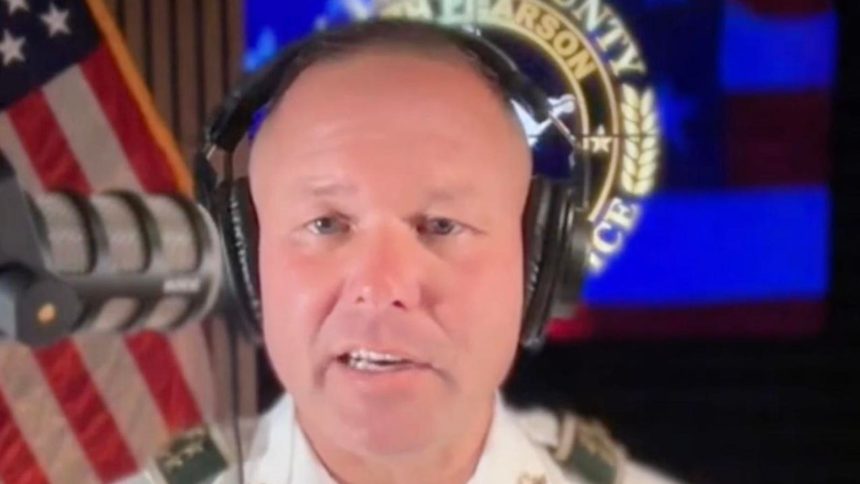Sheriff Keith Pearson of St. Lucie County, Florida, vehemently criticized President Joe Biden’s decision to commute the sentences of 37 federal death row inmates, focusing particularly on the case of Ricardo Sanchez Jr. and Daniel Troya, who were convicted of the brutal 2006 murder of the Escobedo family on a Florida turnpike. The victims included two young children, amplifying the horrific nature of the crime and fueling Pearson’s outrage. The timing of the announcement, just before Christmas Eve, a time traditionally reserved for family gatherings and reflection, further compounded the emotional impact on the victims’ surviving relatives and the community. Pearson described his reaction as a visceral blow, expressing deep empathy for the Escobedo family’s renewed anguish during what should have been a season of peace and togetherness. He questioned the President’s unilateral decision to overturn the jury’s verdict, a verdict reached after careful consideration of evidence and testimony, underscoring the fundamental principle of justice served through a jury of one’s peers.
The President’s decision to commute these sentences reflects his long-held opposition to the death penalty. In his official statement, Biden acknowledged the gravity of the crimes committed by these individuals, expressing condemnation for their actions and sympathy for the victims’ families. However, he reiterated his deeply held conviction, shaped by his extensive experience in the legal system and public service, that the federal government should abolish capital punishment. He framed his decision as a matter of conscience and principle, arguing that the death penalty is ultimately an ineffective and morally questionable form of punishment. While acknowledging the immeasurable pain and suffering endured by the victims and their loved ones, Biden presented his commutations as a step towards a more just and humane criminal justice system.
Sheriff Pearson, however, strongly disagreed with the President’s rationale, emphasizing the meticulous legal process that led to the death sentences. He highlighted the role of the jury, composed of ordinary citizens, who carefully weighed the evidence presented and ultimately reached a unanimous verdict – that Sanchez and Troya deserved the ultimate punishment for their heinous crime. Pearson stressed the belief, shared by himself and the community he serves, that the original sentence was just and appropriate given the horrific nature of the murders. He characterized Biden’s intervention as an abrupt and unwarranted override of the judicial process, dismissing it as “insane” and deeply disrespectful to the victims, their families, and the integrity of the legal system. He expressed profound disappointment that the President would use his executive power to circumvent the carefully considered judgment of a jury.
The stark contrast between the President’s justification and Sheriff Pearson’s condemnation highlights the ongoing debate about capital punishment in the United States. While Biden frames his decision within a broader context of criminal justice reform and moral principles, Pearson’s perspective reflects a local focus on accountability, retribution, and respect for the legal process. The timing of the announcement, on the eve of a major holiday, exacerbated the emotional impact and fueled public discourse surrounding the issue. This case underscores the inherent conflict between the pursuit of justice and the consideration of broader ethical questions surrounding the death penalty. The deeply personal nature of both viewpoints illustrates the complex and often polarized nature of this contentious issue.
The commutations sparked a renewed debate not only about the morality of capital punishment but also about the balance of power between the executive branch and the judicial system. Pearson’s criticism underscores the perceived erosion of the judicial process when executive decisions override jury verdicts. The case of the Escobedo family serves as a potent example of the emotional and political complexities that arise when considering clemency for those convicted of heinous crimes. While the President’s decision reflects his personal convictions and broader policy goals, it simultaneously reignites the pain and suffering of victims’ families and raises questions about the appropriate role of executive power in the criminal justice system.
This incident further underscores the profound impact of violent crime on communities and the enduring struggle to balance competing interests in the pursuit of justice. The Escobedo family’s tragedy serves as a stark reminder of the devastating consequences of such acts, while the subsequent legal proceedings and executive actions highlight the ongoing debate about the most effective and ethical ways to address violent crime. The clash between differing perspectives on justice, punishment, and the role of government underscores the complexity of navigating these sensitive and emotionally charged issues within a democratic society. The case of Sanchez and Troya, brought back into the spotlight by Biden’s commutations, serves as a microcosm of the larger debate about capital punishment and the ongoing search for a system that balances accountability with compassion, retribution with rehabilitation, and the rule of law with the evolving moral conscience of society.



